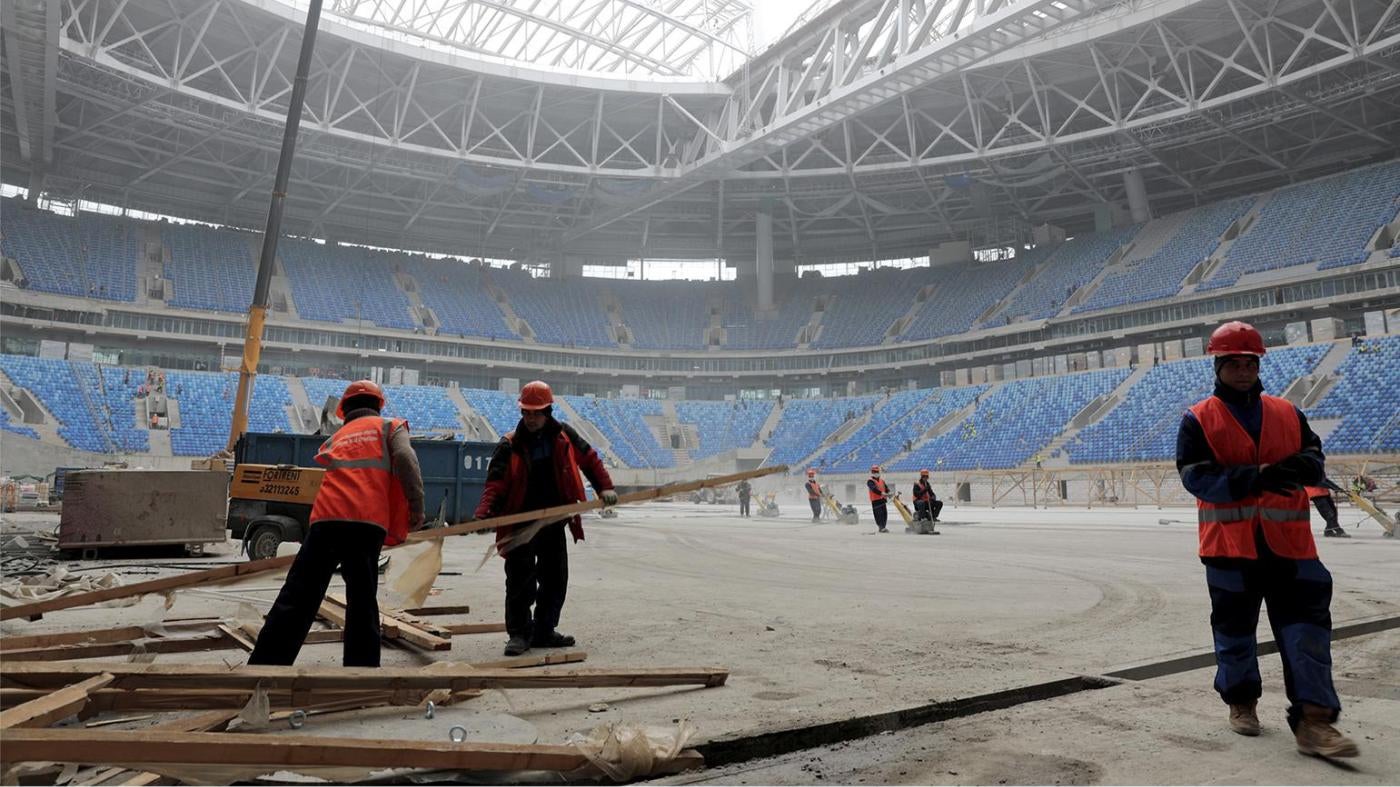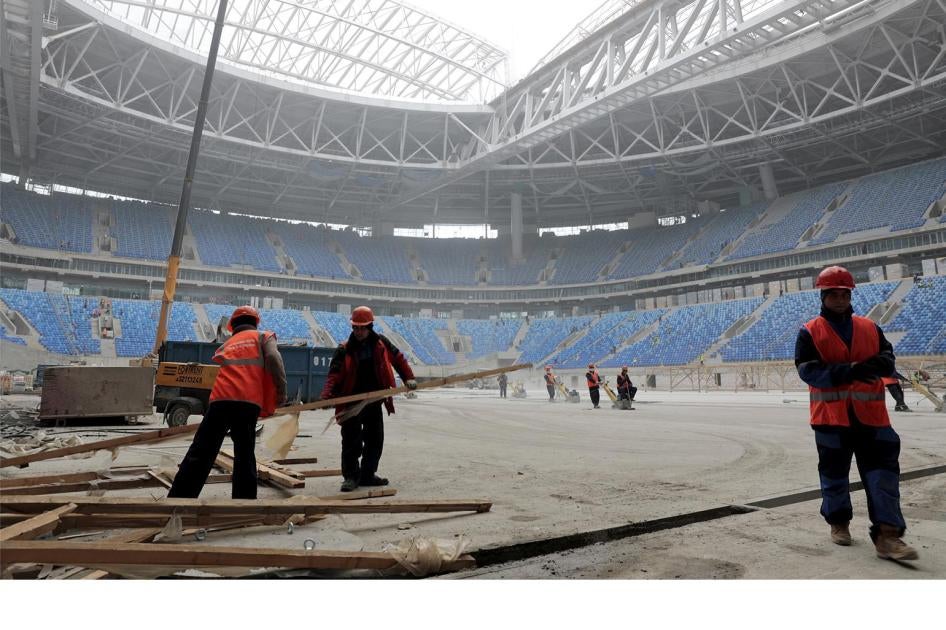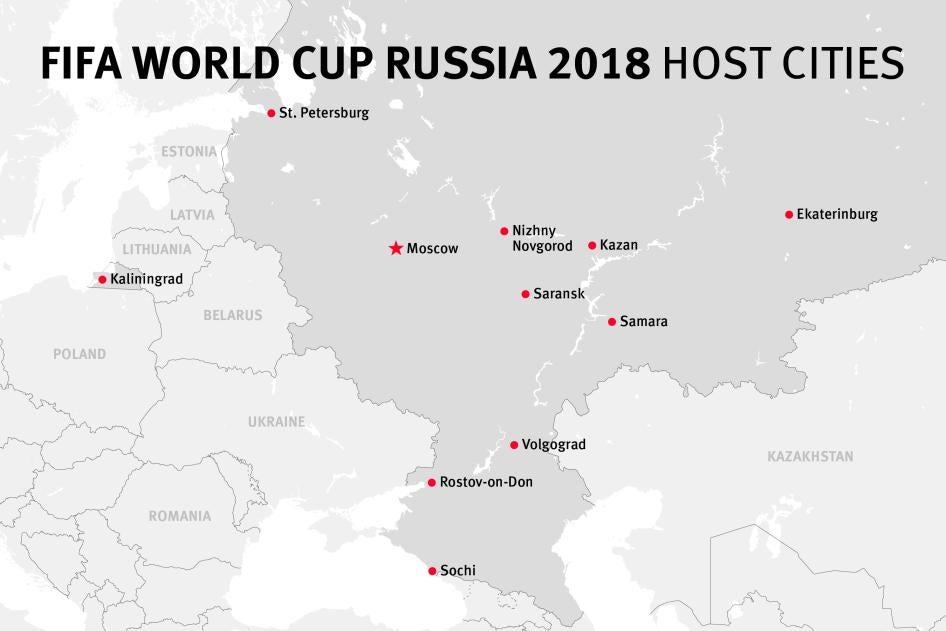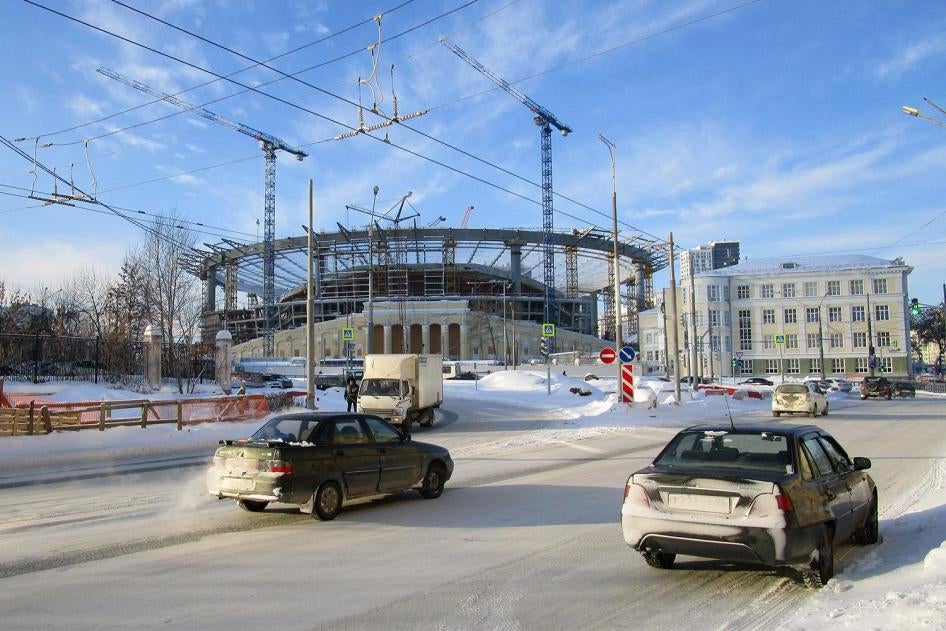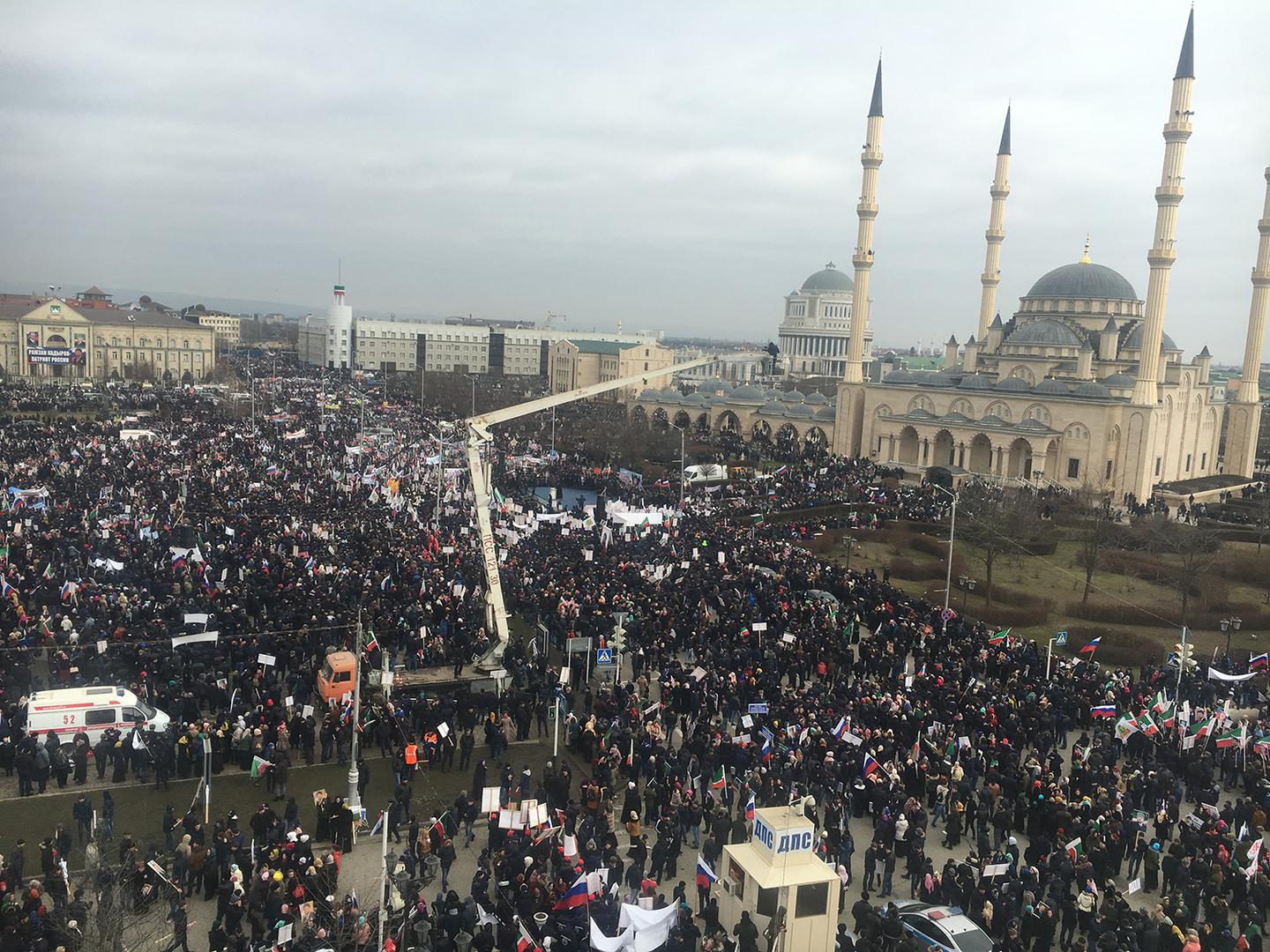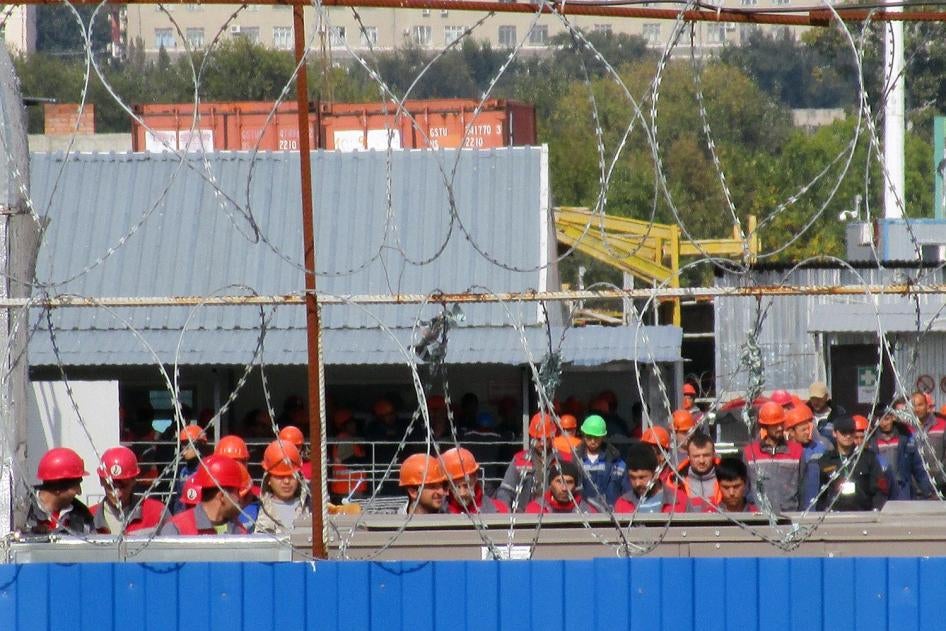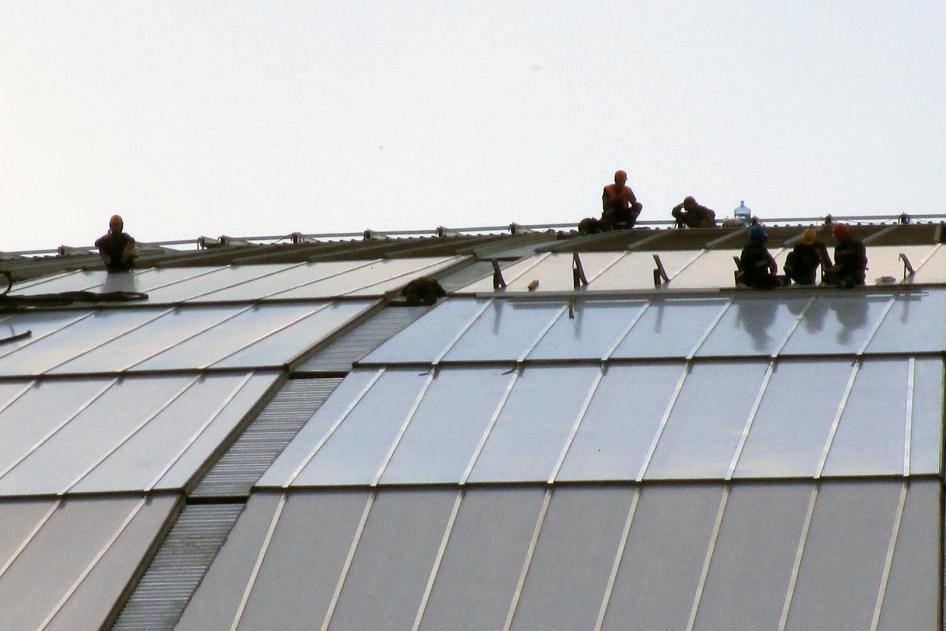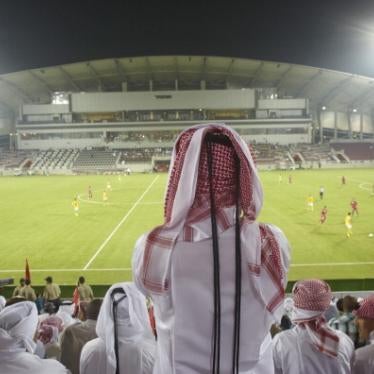While investigating the exploitation of workers in Russia building stadiums for the 2018 World Cup, Human Rights Watch consultant Semyon Simonov was detained by Russian police and unidentified security forces. They held him for three hours and interrogated him. Philippa Stewart talks to Simonov about his experience in a Russian police station, and with Jane Buchanan, associate director of our Europe and Central Asia Division, about abuses construction workers hired for the upcoming football tournament are facing.
You were detained in Volgograd. What you were doing there?
Semyon Simonov: I went to Volgograd to meet workers employed on construction sites for the 2018 World Cup. We later found out that at this site there have been at least three worker deaths as well as serious injuries, so it would have been important to find out why this is happening.
Did you expect trouble at the site?
SS: I wasn’t expecting any trouble at all. I was walking around the construction site of the Volgograd World Cup stadium, taking pictures with a small camera. But I stayed on the road and sidewalk – where pedestrians are free to walk.
Also, I had been doing work like this on other sites in Russia and did not have any trouble. I thought that if security guards asked any questions, I’d be able to answer them because I wasn’t doing anything wrong.
Jane Buchanan: Semyon had been to seven other sites in different cities before he went there. Russia is a very hostile place for human rights researchers, but we were still surprised by his detention. We’ve been doing work on rights of construction workers in the country for nine years.
What happened at the stadium?
SS: When I walked around the building site I saw a security guard and a man in a black jacket – they were talking and looking at me. I understood that wasn’t good, but thought leaving quickly would only lead to problems. And anyway, maybe they would decide not to do anything. I walked along the fence to the river and called a colleague to say I might be arrested.
When I turned back I saw some workers sitting near the workers’ entrance to the stadium site. I decided to approach them to carry on with my work. But standing in my path were three policemen in camouflage clothing. Their breastplates made clear they were policemen.
What happened then?
SS: The policemen and a man who wasn’t in uniform asked me questions. One policeman asked what I was doing. The police wanted to see what I had in my backpack and pockets. I refused the search and refused to show my passport because there was no legal basis for it.
The man without a uniform asked me, “Are you Semyon?” and ordered the police to detain me. They said I should go with them – otherwise they would accuse me of failure to comply with the “lawful orders of a police officer.” Although I legally could have refused, I decided to go along with them. The man not wearing a uniform left and I never saw him again.
I was put in a UAZ, a car often used by the police. I wasn’t in handcuffs.
In the car one policeman spoke on the phone, saying to the person on the other end that his boss had taken him off all cases except for me and that he’d been ordered to come and take me. He also told me that my case had “raised some alarm.”
He said that the whole city was on alert because of me.
What was going through your mind?
SS: Because I hadn’t done anything illegal, I was worried that they would falsely accuse me of something, since they had to justify taking me to the police station. I was also very puzzled by the man who wasn’t in uniform and who had known my name and seemed to be giving orders to the policemen. I asked the police about him, and they said they didn’t know him. It became pretty clear to me that he was in all likelihood Russian Federal Security Service (FSB) which suggested my risk of facing false charges was much higher. This was very worrying.
We drove probably about 20 minutes. I asked where they were taking me. They told me that we were going to the Central District police station. When we arrived, I saw a sign at the entrance confirming it was a police station.
How were you treated in the police station?
SS: First they kept me in the room where they hold all the new detainees. There were three other people there, all drunk. The officer who initially detained me asked for my passport and I refused to show him. He asked for my name, place of birth, and residence. I told him and he immediately passed on this information by phone.
I was led into a corridor near the cell and into a small interrogation room that stank of chemicals. There were no CCTV cameras, the windows were just under the ceiling, and the door was tightly closed.
They began to press me hard to tell them why I had come here [to Volgograd], who I was going to meet, which cities I had gone to, where I was going in the future, which hotel I was staying in, etc. One man tried to grab my passport from me and nearly tore it. A fellow officer carried a gun and went from sitting, to standing over me, to pacing around the room. From time to time they both went out and a “good cop” came in who talked to me about his life, work, and the sights of Volgograd, and then sometimes repeating questions asked earlier.
They wanted to go through my backpack, and I refused unless there were witnesses and everything was officially recorded in writing. They also searched my person and my pockets but they didn’t write that down.
The pressure grew stronger and stronger. They said that maybe I am a saboteur looking for information to disrupt the World Cup. I decided then it would be dangerous to talk to them anymore. After about three hours, I said that they should immediately release me, as the law required, and I got up and went to the door. One man grabbed my hand when I was already opening the door and forced me to step back. After that, I was left alone in an office. I called the station duty officer using the phone in the room and complained about the use of force, but they hung up.
Then I called the police hotline for the Main Directorate of the Ministry of Internal Affairs in the Volgograd region and recorded a complaint.
After that the “good cop” and the one with the gun came into the room and said that I could go and opened the door for me.
JB: As soon as he was released he called me and told me what had happened, I was really very worried for him. Although he talked about his detention in a very calm way, I was worried because they knew his name and we knew he was being followed.
It was completely unexpected and he had every reason to feel shaken and unsafe. I wanted him to get out of the city before anything else happened.
Let’s talk about the workers. What type of abuses did you find elsewhere?
JB: We interviewed people who had been locked out of the construction sites after they asked about unpaid wages or complained about site conditions. We heard stories of workers complaining and then being detained.
A lot of the problems surround non-payment of wages. The payments are sometimes delayed for months and workers feel trapped because if they leave, they will have lost all that time and labour and won’t have anything to show for it.
The workers are often migrants, either from outside Russia, or who have moved internally for work. Often their families at home depend on the money being sent back to live.
For the first time, FIFA set up a system to monitor labor conditions on World Cup sites, and that is a positive move. But FIFA needs to make sure this monitoring is effective, and that workers aren’t prevented from talking to them for any reason. It also needs to make public information about labor conditions it has found during its inspections, and what the outcomes have been for any workers who faced abuse. Monitoring isn’t credible without published results.
If the Russian authorities and FIFA guarantee our researchers’ safety, we’ll continue the work. FIFA says its interested in independent information about working conditions on World Cup sites, but at this point it’s a very serious risk for us to play that role.
I’m worried about what will happen over the next year, with lots of journalists and others interested in learning more about Russia as a World Cup host in this kind of intimidating atmosphere.
This interview has been edited and condensed.
